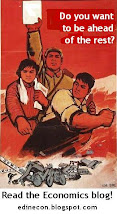It is a fallacy that political talk radio is motivated by ideologyImpressive, don´t you think?
"The persistence of this fallacy among left-wing opponents of talk radio is extraordinary (...) the usual claim here is that right-wing radio is "owned by large, profit-hungry corporations of wealthy, profit-driven individuals, who use their companies to push a conservative, pro-capitalist agenda." This analysis also identifies the gross economic illogic of this claim. Suppose that I am the conservative and rabidly capitalist owner of a radio company. I believe that the free-market conservatism is Truth and that the US would be better off in every way if everybody were conservative. This, for me, makes conservatism a "public good" in the Intro Econ sense of the term - i.e., a conservative electorate is a public good in the same way that a clean environment or a healthy populace is a public good. And the same basic economics that explains corporate contributions to air pollution and obesity explains why my radio company has zero incentive to promote the public good of conservatism. Because the time and money my one company would spend trying to spread the Truth would yield (at best) only a tiny increase in the conservatism of the whole country - and yet the advantages of that increased conservatism would be shared by everyone, including my radio competitors, even though they wouldn't have put themselves out one bit to help shift public opinion. In other words, I alone would have paid for a benefit that my competition could also enjoy, free. All of which plainly would not be good business... which is why it is actually in my company's best interests to "under-invest" in promulgating ideology."
Tuesday 22 June 2010
Economic thinking and political radio shows
Subscribe to:
Posts (Atom)



